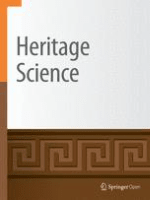
Heritage Science
Scope & Guideline
Elevating the Standards of Archaeology and Conservation Research
Introduction
Aims and Scopes
- Conservation Science:
The journal explores methodologies for the conservation of various cultural heritage materials, including textiles, ceramics, and architectural structures, utilizing scientific techniques such as spectroscopy, chromatography, and nanotechnology. - Digital Heritage:
A significant focus is placed on the digital preservation and reconstruction of heritage sites and artifacts through techniques like 3D modeling, digital imaging, and virtual reality, enhancing accessibility and understanding of cultural heritage. - Cultural Heritage Management:
Research on effective management practices for cultural heritage sites, including sustainability and community involvement, is highlighted, emphasizing the link between heritage conservation and socio-economic development. - Material Analysis:
The journal includes studies on the characterization and analysis of materials used in historical artifacts, employing techniques such as X-ray fluorescence and Raman spectroscopy to understand their composition and degradation mechanisms. - Interdisciplinary Approaches:
Heritage Science promotes interdisciplinary collaboration, integrating perspectives from archaeology, history, art conservation, and environmental science to address complex issues related to cultural heritage preservation.
Trending and Emerging
- Artificial Intelligence and Machine Learning:
The application of AI and machine learning techniques for the analysis and restoration of cultural heritage artifacts is on the rise, showcasing the potential for automation and improved accuracy in heritage science. - Sustainability in Heritage Conservation:
There is an increasing focus on sustainable practices in conservation, including the use of eco-friendly materials and methods, reflecting a growing awareness of environmental impacts in heritage management. - Impact of Climate Change:
Research addressing the effects of climate change on cultural heritage sites is becoming more prominent, highlighting the urgent need for adaptive strategies in conservation efforts. - Community Engagement and Public Participation:
Emerging themes emphasize the role of local communities in heritage conservation, promoting participatory approaches that involve stakeholders in decision-making processes. - Integration of Digital Tools:
The use of digital tools for documentation, analysis, and public engagement in cultural heritage is increasingly prevalent, reflecting a trend towards enhancing accessibility and interaction with heritage through technology.
Declining or Waning
- Traditional Techniques:
There appears to be a declining emphasis on traditional conservation techniques in favor of more technologically advanced methods, reflecting a broader trend towards innovation in heritage science. - Pure Historical Studies:
Papers focusing solely on historical narratives without integration of scientific methodologies have become less common, suggesting a shift towards more empirical and data-driven research. - Localized Case Studies:
While localized case studies were previously prevalent, there is now a trend towards broader, more comparative studies that integrate findings across multiple regions, indicating a shift in research scope.
Similar Journals
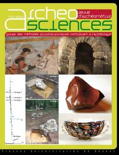
ArcheoSciences-Revue d Archeometrie
Unveiling the Past: Bridging Science and ArchaeologyArcheoSciences-Revue d Archeometrie is a prominent scholarly journal dedicated to the field of archaeology, published by PRESSES UNIV RENNES in France. With an ISSN of 1960-1360 and an E-ISSN of 2104-3728, this journal has gained recognition for its focus on the intersection of science and archaeological research, aiming to foster interdisciplinary dialogue and innovative methodologies within archaeological studies. Although coverage of the journal has been discontinued in Scopus post-2021, it has maintained a respectable standing with a Q3 Quartile ranking in both the Archaeology (Arts and Humanities) and Archaeology categories as of 2023, as well as commendable Scopus rankings in relevant fields. As an accessible platform for researchers, professionals, and students, ArcheoSciences offers valuable insights into applied techniques and findings in archaeological science, making it an essential resource for those involved in the historical and cultural analysis of material relics. Researchers are encouraged to explore this journal to stay informed about frontier research and ongoing discussions in the discipline.

Rock Art Research
Illuminating the Past, Inspiring the FutureRock Art Research, published by Archaeological Publishing, is a prestigious journal dedicated to the interdisciplinary study of rock art, encompassing anthropological, archaeological, and visual arts perspectives. With a proud heritage established across various publication years, this journal has established itself as a leading platform in the field, achieving a remarkable Q1 quartile ranking in both Anthropology and Archaeology as of 2023, along with notable positions in the Visual Arts and Performing Arts categories. Its exceptional standing is evidenced by impressive Scopus rankings, solidifying its influence and relevance within the academic community—ranking 36th out of 667 in Visual Arts and 67th out of 413 in Archaeology. Though not an open-access journal, Rock Art Research remains crucial for scholars, professionals, and students looking to deepen their understanding of rock art and its implications in cultural heritage. The journal's focus on high-quality research makes it an essential resource for those engaged in exploration and preservation efforts in this fascinating area of study.
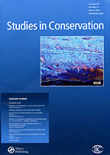
STUDIES IN CONSERVATION
Preserving the Past, Shaping the FutureSTUDIES IN CONSERVATION, published by Routledge Journals, Taylor & Francis Ltd, stands as a premier peer-reviewed journal in the field of conservation, holding a distinguished Q1 ranking in the Conservation category for 2023. With its origins dating back to 1952 and poised to continue through 2024, this respected journal provides a vital platform for disseminating high-quality research and innovative practices aimed at the preservation of cultural heritage and natural environments. The journal boasts an impressive Scopus rank of #15 out of 103 within its category, reflecting its influential role in shaping the dialogue among researchers, professionals, and students dedicated to conservation efforts. While Open Access options are not currently available, the journal remains accessible to a broad readership eager to engage with its in-depth analyses and critical studies that address urgent conservation challenges. The editorial team seeks to promote diverse perspectives and foster interdisciplinary collaboration, making STUDIES IN CONSERVATION an essential resource for anyone committed to advancing the field of conservation.
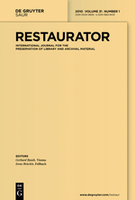
RESTAURATOR-INTERNATIONAL JOURNAL FOR THE PRESERVATION OF LIBRARY AND ARCHIVAL MATERIAL
Preserving the Past, Shaping the Future.RESTAURATOR-INTERNATIONAL JOURNAL FOR THE PRESERVATION OF LIBRARY AND ARCHIVAL MATERIAL, published by WALTER DE GRUYTER GMBH in Germany, is an esteemed scholarly journal dedicated to the conservation and preservation of library and archival materials. With a history spanning from its first publication in 1970, this journal has become a vital resource for professionals, researchers, and students in the fields of conservation, materials science, and media technology. The journal holds a Q2 classification in Conservation and positions itself within the top 30% of its peer category, reflecting its commitment to quality research and innovative practices. Although the journal is not open access, it offers invaluable insights into preservation methodologies, case studies, and advances in materials technology, supporting the ongoing dialogue within the conservation community. Its indexed presence in Scopus, especially notable in the Arts and Humanities and Engineering categories, further underscores its relevance and impact in shaping contemporary practices in conservation.
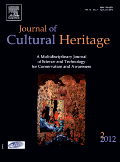
JOURNAL OF CULTURAL HERITAGE
Advancing Knowledge in Heritage Conservation.JOURNAL OF CULTURAL HERITAGE, published by Elsevier France - Éditions Scientifiques Médicales Elsevier, is a pivotal academic journal dedicated to the multifaceted study of cultural heritage, including its conservation, anthropology, archaeology, and related fields. With an impressive standing in the academic community, this journal has achieved a Q1 ranking in Anthropology, Archaeology, Conservation, and History, reflecting its critical influence and contribution to these disciplines. The journal serves as a vital resource for researchers, professionals, and students interested in innovative research and developments concerning cultural heritage practices and policies. Although it operates under a subscription model, it provides access to innovative research and insights from the field, making it essential for those engaged in the preservation and study of cultural artifacts and historical narratives.
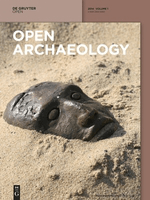
Open Archaeology
Bridging Gaps in Archaeology and EducationOpen Archaeology is a distinguished open-access journal dedicated to publishing high-quality research in the fields of archaeology, conservation, and education. Since its inception in 2015, the journal has established itself under the esteemed publication of DE GRUYTER POLAND SP Z O O, experiencing rapid growth and recognition, culminating in a Q1 ranking in both Archaeology and Conservation categories as of 2023. Based in the vibrant academic environment of Poland, Open Archaeology caters to a global audience, illustrated by its Scopus rankings which position it 16th in Conservation and 69th in Archaeology, showcasing its significant impact in the arts and humanities sphere. The journal aims to foster interdisciplinary discourse and disseminate innovative research findings to enhance understanding and preservation of cultural heritage. With an unwavering commitment to open access, it encourages widespread dissemination of knowledge, making it an invaluable resource for researchers, professionals, and students alike.

Archeomatica-Tecnologie per i Beni Culturali
Empowering Cultural Heritage through Technology.Archeomatica-Tecnologie per i Beni Culturali is a prestigious open-access journal dedicated to the field of cultural heritage technologies. Published by ARCHEOMATICA, this journal prides itself on disseminating high-quality research focused on innovative methodologies and technologies that enhance the preservation, conservation, and management of cultural assets. Since its inception in 2011, Archeomatica has fostered an inclusive platform for researchers, professionals, and students to share insights and advancements in the integration of science and technology within the cultural heritage sector. With a commitment to accessibility, all articles are freely available, promoting a collaborative academic environment. This journal is essential for those interested in bridging the gap between cultural heritage preservation and technological innovation, helping to ensure the longevity of our shared history.
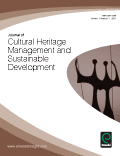
Journal of Cultural Heritage Management and Sustainable Development
Empowering research to protect our cultural legacy.Journal of Cultural Heritage Management and Sustainable Development is a pioneering publication dedicated to advancing the fields of cultural heritage management and sustainable practices. Published by Emerald Group Publishing Ltd in the United Kingdom, this journal has established itself as a critical resource since its inception in 2011, with an ongoing commitment to quality research through 2024. The journal is notably recognized with a Q1 ranking in Conservation and boasts impressive Scopus rankings, highlighting its significant impact in the realm of arts and humanities. It also showcases a multidisciplinary approach, bridging gaps between business management and urban studies, thereby providing invaluable insights to researchers, professionals, and students. With diverse access options to engage a broad audience, the Journal of Cultural Heritage Management and Sustainable Development thrives at the intersection of scholarship and practical application, making it an essential read for those dedicated to fostering sustainable development in cultural heritage contexts.

Conservar Patrimonio
Championing the Art and Science of Conservation.Conservar Patrimonio is a leading academic journal dedicated to the fields of conservation and museology, published by the ASSOC PROFISSIONAL CONSERVADORES-RESTAURADORES PORTUGAL. Established as an open access platform since 2005, it aims to disseminate high-quality research and innovations essential for the preservation of cultural heritage. With an impressive 2023 impact factor, Conservar Patrimonio holds a Q2 ranking in Conservation and a Q1 ranking in Museology, reflecting its significant contribution to both disciplines. The journal is indexed amongst the top 30% of publications in the Museology category and offers valuable insights into the methodologies and practices that shape the conservation of cultural artifacts. Researchers, professionals, and students are encouraged to engage with the latest findings, case studies, and theoretical explorations presented in this esteemed journal based in Portugal, enhancing the global dialogue on conservation practices.

DENKMALPFLEGE
Advancing Knowledge in Cultural Preservation.DENKMALPFLEGE is a prestigious journal published by DEUTSCHER KUNSTVERLAG GMBH, focusing on the field of cultural heritage conservation and restoration. With its ISSN 0947-031X and E-ISSN 2569-1589, this publication serves as an essential resource for researchers, professionals, and students dedicated to the preservation of historical monuments and sites. Although the journal does not currently offer open access, it provides a valuable wealth of scholarly articles, case studies, and reviews that critically engage with contemporary debates in conservation practices. Published in Munich, Germany, it bridges academic research with practical applications, underlining its importance in enhancing the discourse surrounding heritage preservation. Alongside its historical coverage from 2009 to 2012, DENKMALPFLEGE continues to be a vital platform for advancing knowledge in the field, promoting best practices, and fostering collaboration among experts.